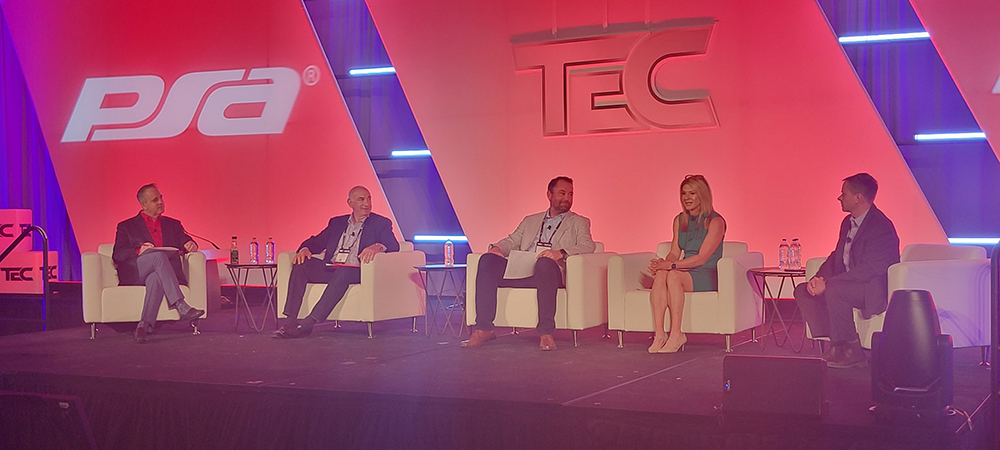Industry is ‘stable’ but needs new talent, experts say

By Cory Harris, Editor
Updated 12:07 PM CDT, Wed March 12, 2025

DENVER—Industry capital investment and workforce development were among the hot topics covered during the State of the Industry panel at PSA TEC 2025.
Moderated by Matt Barnette, CEO, PSA Security Network, the panelists for one of the more highly anticipated sessions at PSA TEC were:
- Robert Chefitz, managing partner, Egis Capital Partners;
- Ron Oetjen, corporate president, Minuteman Security & Life Safety;
- Stephenie Haldane, vice president of end user sales, HID; and
- Geoff Kohl, senior director of marketing, Security Industry Association (SIA)
Capital investment
Chefitz noted that the amount of capital coming into security continues to grow because of the “fundamental stability” of the industry.
“The underlying domain for security services and security products is absolutely growing,” he stated. “We have a fundamental belief that the need and demand by the public commercial entities and individuals is growing, and the capacity of the police who respond is shrinking. That gap is being filled with the capabilities that you here in this room deliver, so that's attracting a tremendous amount of capital.”
At the same time, Chefitz noted that this influx of capital is shifting how the industry “can and I think will compete.”
“On one hand, if you look at the systems integration side, you're seeing a number of platforms backed by private equity consolidating the industry, growing their businesses,” he explained. “We'll see how that all works out at the kind of prices people are paying.”
Another factor that is “shaping the industry” is the “tremendous amount” of capital coming in on the venture side, Chefitz noted, citing Verkada raising more than $700 million in funding since its establishment in 2016 “to support its own salesforce.”
Integrator challenges
Barnette noted that bringing talent into the industry is “the No. 1 challenge” for systems integrators, not just in North America but on a global basis. Kohl pointed out that it’s not just integrators facing this problem, it’s technology manufacturers and practitioners, as well.
“We have to change the outlook of the industry,” stated Kohl, an industry veteran of more than 20 years. “We have got to be able to tell the story that we are one of the coolest high-tech industries. You work in an industry where you’re protecting people and property, but you also get to work with the very latest in technology.”
Oetjen noted that his company uses internships and mentoring programs for young employees but added that he’s “very surprised” at the gap that exists in some organizations between hiring people and training them. He acknowledged that their ability to use their smartphones helps them when they come on board.
“They pick it up so fast because they're so used to using their phone,” he explained. “You’ve got to teach them on the other side the voltage and the amperages and those kinds of things, but they can come in and actually be pretty helpful early.”
Haldane cited a commitment to invest in young talent with the “fresh perspectives” they offer an organization. She noted that there were some gaps at her company where they brought in younger people with limited access control or no security experience at all, and invested in them with the notion that “bringing in these people is going to help us.”
“This generation that I've recently brought in, I love it because they challenge us,” she said. “They really want to look at the industry and say, ‘Hey, how do we make this industry sexy and bring it back?’”
Comments